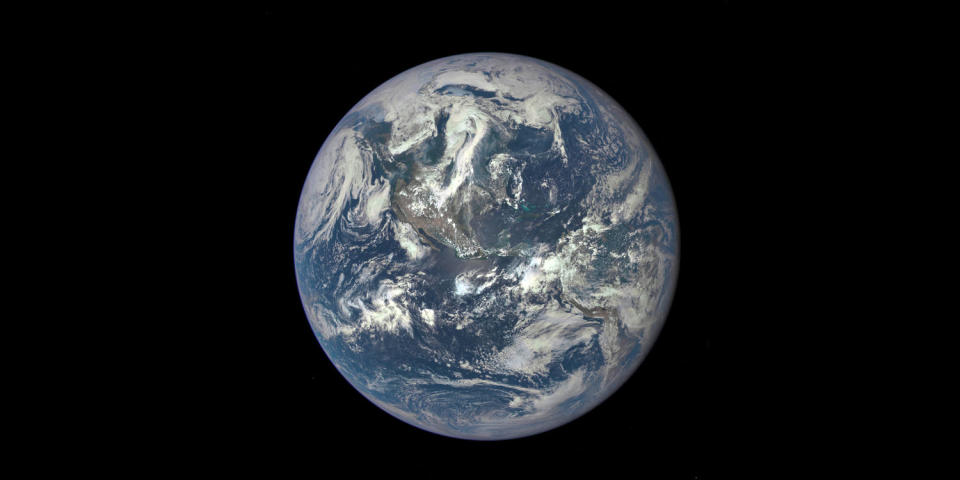Global warming has slowed the Earth’s rotation slightly, and this may affect how we measure time.
A study published Wednesday found that melting polar ice — an accelerating trend driven primarily by human-caused climate change — is causing the Earth to spin less quickly than it normally does.
The study’s author, Duncan Agnew, a geophysicist at the Scripps Institution of Oceanography at the University of California San Diego, said that as the ice at the poles melts, where the Earth’s mass is concentrated changes. The change affects the angular velocity of the planet.
Agnew likened the dynamic to a skater spinning on ice: “If you have a skater who starts spinning, if they lower their arms or extend their legs, they’re going to slow down,” he said. However, if the skater’s arms are pulled inward, the skater will spin faster.
So less solid ice at the poles means more mass around the equator, the Earth’s waist.
“What you do with melting ice is you take water that is frozen solid in places like Antarctica and Greenland, and you melt that frozen water and move the liquids to other parts of the planet,” Thomas Herring said. a professor of geophysics at the Massachusetts Institute of Technology who was not involved in the new study. “Water flows towards the equator.”
In other words, the study suggests that human influence is at play with a force that scientists, stargazers, and scientists have pondered for thousands of years; this has long been considered a constant beyond humanity’s control.
“The fact that we’ve done something that measurably changes the speed at which the Earth rotates is pretty impressive, even to me,” Agnew said. “Unprecedented events are happening”
His study, published in the journal Nature, suggests that climate change is playing such a significant role in Earth’s rotation that it delays the possibility of a “negative leap second”. If the polar ice caps had not melted, one second might have to be removed from worldwide clocks as soon as 2026 to keep universal time in sync with the Earth’s rotation, which is affected by a variety of factors.
Instead, the impact of climate change has pushed that possibility back by an estimated three years. If timekeeping organizations eventually decide to add a negative leap second, this adjustment could disrupt computer networks.

The reason leap second adjustments are needed is that, even without climate change, the Earth’s diurnal rotation would appear constant but trend slower over time.
About 70 million years ago, days were shorter, lasting about 23.5 hours, according to a study in Paleo-Oceanography and Paleoclimatology. This means that Cretaceous dinosaurs lived on a planet with 372 days each year.
Some of the fundamental factors that influence the planet’s rotation sometimes work in opposite directions.
The friction of ocean tides, caused in part by the Moon’s gravitational pull, slows the Earth’s rotation. Meanwhile, since the last Ice Age, the crust has been rising in some areas in response to the decreasing weight of the ice sheets. This effect changes where the mass is distributed and accelerates the planet’s rotation. Both of these processes are fairly constant and have predictable rates.
Another factor, Agnew said, is the movement of fluid in the Earth’s liquid inner core; this is a wild card that can speed up or slow down the rate of Earth’s rotation.
Now polar ice melt has been added to the mix. As climate change intensifies, researchers expect ice melt to have a more profound impact on the planet’s rotation.
“As time goes on and melting accelerates, it will likely have a larger contribution, which we expect it will,” Herring said. He added that the new study is a comprehensive and robust analysis that combines research from various disciplines of science.
The need for timekeepers to adjust universal time to align with the Earth’s rotation is not a new phenomenon. But historically this involved adding leap seconds to the common standard for clocks, because the Earth’s slowing rotation causes astronomical time to fall behind atomic time (measured by the vibration of atoms in atomic clocks).
But in recent years, the Earth has rotated faster than expected due to fluctuations in its core. This prompted timekeepers to consider whether it might make sense to subtract a leap second to keep universal time in line with the Earth’s rotation for the first time since Coordinated Universal Time was officially adopted in the 1960s.
Melting polar ice reversed this trend and prevented any decision point regarding a negative leap second. According to Agnew’s predictions, if the current pace of Earth’s rotation continues, that possibility has been postponed by three years, from 2026 to 2029.
Adding and subtracting leap seconds is troublesome because they have the potential to disrupt satellite, financial, and energy transmission systems that rely on extremely precise timing. Therefore, global timekeepers voted in 2022 to eliminate adding and subtracting leap seconds by 2035, allowing universal time to deviate from the Earth’s rotation rate.
“There has been an effort to get rid of leap seconds since about 2000,” Agnew said.
Whether the clocks change or not, the idea that melting polar ice is affecting the Earth’s rotation shows just how important an issue this has become. Research has already identified the profound impact ice loss will have on coastal communities.
Scientists expect sea level rise to accelerate as the climate warms, a process that will continue for hundreds of years. Last year, leading polar researchers warned in a report that parts of major ice sheets could collapse and that coastal communities should be prepared for meters of sea level rise. If humanity allows average global temperatures to rise by 2 degrees Celsius, the planet could be set to rise more than 40 feet in sea level.
This article first appeared on NBCNews.com.